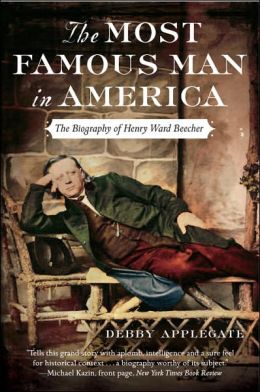Sex, Politics, and the Preacher
 Wednesday, May 8, 2013 at 11:23AM
Wednesday, May 8, 2013 at 11:23AM 
Debby Applegate's Pulitzer Prize winning biography of Henry Ward Beecher (2006) is well worth reading. All of the elements that make for a compelling story are here (at least for those who frequent this blog): a sex scandal and a sensational court trial, the fiery preaching of political activism and social reform, and an open disdain for confessional Reformed theology. And this, one hundred years before Jim and Tammy and brother Swaggart made the headlines for much the same. As Yogi Berra aptly put it, "the more things change, the more things stay the same." There are many echoes of the "evangelical" preacher Henry Ward Beecher in today's evangelicalism.
Beecher was for a time--as the title of the book informs us--the most famous man in America. The brother of Harriet Beecher Stowe (the author of Uncle Tom's Cabin) and son of famous Congregationalist/tepid Presbyterian preacher Lyman Beecher, as well as an acquaintance of Abraham Lincoln's, Henry Beecher's story is quite remarkable, and sadly, altogether typical of someone who has lost his way--theologically and morally. Beecher's story plays out during the pre-Civil War years (and beyond) as we witness Beecher's ambivalence about hitching his personal wagon (and his future as a preacher) to the Abolitionist movement.
In the "how quickly we forget" department, Beecher stands at the formative headwaters of a distinct "evangelical movement" as several evangelical ministers of that era (when relocation to the West was an important opportunity for empire building) sought more and more public prominence (and larger and more influential churches), and in the process, gave up their fading loyalties to the established Protestant denominations and doctrine of Colonial America. If Henry Ward Beecher was the most famous man of his day, he is surely among the most forgotten of ours.
Several things ought to be mentioned as items of interest. As for Beecher's disdain for Reformed theology, Applegate describes Lyman Beecher (Henry's father) as an "orthodox Calvinist" (20), teaching his family a religion of fatalism, fear of sin, and a vivid awareness of human corruption (25). The Beecher's Calvinism was characterized by a stern and rigorous life of family worship, church attendance (including lectures, memorization of the Westminster Confession, and prayer meetings) as well as continuous religious instruction throughout the week (28). Henry recalls the Lord's Day as the "dreadful day of the week," a day of "thou shalt not, thou shalt not" (35).
Applegate makes no mention of the role of Christ's cross in any of this, repeatedly describing the family's religious life as one of a joyless, almost fatalistic drudgery, capped off by a constant fear of hell. If this is an accurate representation of life in the Beecher home, we can hardly wonder why Henry W. rejected the Calvinism of his father, even as his father did later in life. The Calvinistic "orthodoxy" of Lyman Beecher is suspect to the degree to which law is divorced from Gospel. There is an important lesson in this, since this form of joyless "Calvinism" sounds very much like the predestinarian moralism identified and repeatedly trounced by Scott Clark.
One especially interesting vignette (208-209) is the account of Henry's ordination examination before a board of congregational ministers, including the famed "liberal" pastor Horace Bushnell of Hartford--who did not believe a word of the Reformed doctrine Henry Beecher was required to define and defend in Bushnell's presence.
When Henry Beecher was asked about the doctrine of election (the first question in his exam), Beecher answered that he had been so busy trying to "save souls" during his time in Cincinnati, that he had not the time to engage in the spiritual calculus he associated with the doctrine of election and its attending doctrine, reprobation. Whatever reservations the examiners had (apparently enough that Henry did not sustain the exam), they were outweighed by Henry's personal testimony (no surprise there), and his brother Edward's pleas to reconsider (Edward was also a Congregationalist minister and was present for the exam). Despite the initial negative vote, Henry was eventually, albeit reluctantly, approved by the examiners.
The Beecher family had a good laugh about the exam later. Probably not something to laugh about, but exactly what you would expect of Henry Ward Beecher.
All is all, this is a good read, and certainly might be of interest to many of you (especially those with Amazon gift cards to redeem).
You can find the book here: The Most Famous Man in America


Reader Comments (1)
Creepy.
Such is non-confessional faith!